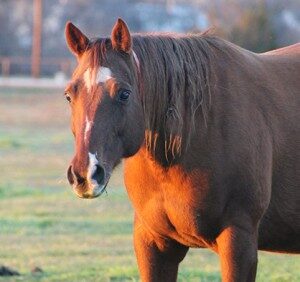Exercise and the Older Horse
By Kentucky Equine Research Staff
Through a combination of commitment by horse owners and improved understanding of the special needs of geriatric equines, aged horses are living longer, richer lives. In turn, many older horses continue to earn their keep, so to speak, and undertake various athletic activities with their owners. The question is, can older horses hack the work?
“Absolutely,” affirmed Kathleen Crandell, Ph.D., an equine nutritionist for Kentucky Equine Research (KER). “Horse owners should know, though, that the normal aging process does alter basic physiology, and older horses cannot always be expected to perform at the same level as younger horses.”
A recent review of the topic* identified a number of important differences between older and younger athletic horses, including the following:
- Lowered aerobic capacity and maximal heart rate. This means that it takes less work for older horses to reach their maximal oxygen uptake level compared to younger horses. This could be caused by inherent changes in the hearts and muscles of older horses. Owners using heart rate monitors for heart rate-based training may need to temper their training regimes in older horses “to safely produce a training effect without compromising other physiologic systems.”
- Decreased ability to thermoregulate. Older horses experience a faster increase in core body temperature than younger animals, potentially due to decreased blood flow to the skin that is needed to liberate heat from the body. This is especially true in hot, humid conditions.
- Altered fluid balances. Older horses have less fluid in their bloodstreams (called plasma volume). Young exercising horses enter a state of “hypervolemia,” increased plasma volume, to help support their cardiovascular systems and increase blood flow to the skin for thermoregulation.
- Potential change in muscle fiber type. Some studies show that as horses age, the type of muscle fibers change, making them less suited for endurance exercise.
- Endocrine or hormonal alterations. Growth hormone, stress hormones, and metabolic hormones all play a role in exercise and recovery from exercise. Evidence suggests these hormones do not function as efficiently in older horses.
- Other body systems. The immune, renal, gastrointestinal, and musculoskeletal systems also age, and alterations in each system can impact an older horse’s ability to perform.
In sum, McKeever noted, “Despite clear advantages of exercise on health and physiology for all ages, exercise training protocols that are appropriate for younger animals may not be appropriate for older horses.”
“To help support older, exercising horses, consider boosting their immune systems by supplementing with omega-3 fatty acids such as those found in EO-3, and natural vitamin E, particularly a highly available source such as Nano-E,” Crandell suggested.
*McKeever, K.H. 2016. Exercise and rehabilitation of older horses. Veterinary Clinics of North America: Equine Practice. 32:317-332.











